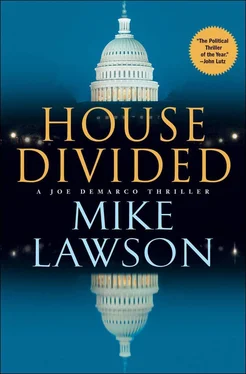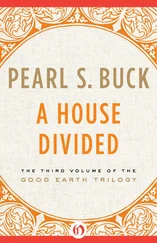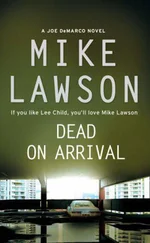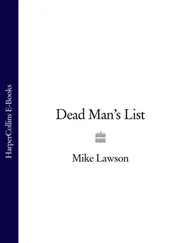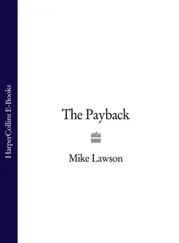Mike Lawson - House Divided
Здесь есть возможность читать онлайн «Mike Lawson - House Divided» весь текст электронной книги совершенно бесплатно (целиком полную версию без сокращений). В некоторых случаях можно слушать аудио, скачать через торрент в формате fb2 и присутствует краткое содержание. Жанр: Триллер, на английском языке. Описание произведения, (предисловие) а так же отзывы посетителей доступны на портале библиотеки ЛибКат.
- Название:House Divided
- Автор:
- Жанр:
- Год:неизвестен
- ISBN:нет данных
- Рейтинг книги:3 / 5. Голосов: 1
-
Избранное:Добавить в избранное
- Отзывы:
-
Ваша оценка:
- 60
- 1
- 2
- 3
- 4
- 5
House Divided: краткое содержание, описание и аннотация
Предлагаем к чтению аннотацию, описание, краткое содержание или предисловие (зависит от того, что написал сам автор книги «House Divided»). Если вы не нашли необходимую информацию о книге — напишите в комментариях, мы постараемся отыскать её.
House Divided — читать онлайн бесплатно полную книгу (весь текст) целиком
Ниже представлен текст книги, разбитый по страницам. Система сохранения места последней прочитанной страницы, позволяет с удобством читать онлайн бесплатно книгу «House Divided», без необходимости каждый раз заново искать на чём Вы остановились. Поставьте закладку, и сможете в любой момент перейти на страницу, на которой закончили чтение.
Интервал:
Закладка:
Since Dillon had expected this development, he had set up Claire’s division well in advance of Mr. Risen’s party-spoiling revelation. The division consisted of a few hundred handpicked folk out of the thirty thousand employed by the NSA, and they were moved into an isolated annex on the sprawling grounds of Fort Meade. And when the rest of the agency went back to playing Mother-May-I with the FISA Court, Claire’s technicians just continued to monitor communications as they pleased-and warrants be dammed.
The majority of the work that Claire’s techs did was accomplished inside large computers, and it’s rather difficult to tell what a person is doing when all that’s evident to the naked eye is a man sitting in front of a machine. It becomes even harder to tell when that same person controls the reports generated by the machine. And the functions accomplished by Claire’s eavesdroppers were not in any way unique to the agency, and almost everything they did was electronically piggybacked on top of legitimate FISA-sanctioned operations. That is, when the NSA obtained a FISA warrant to tap into certain cables to monitor certain folk, the work would be assigned to Claire’s division and they significantly expanded the scope of the warrant.
It was also amazingly easy for Dillon to hide the activities of Claire’s secret division from his superiors. It was, in fact, depressingly easy. The current Director of the NSA was a three-star navy admiral; the deputy director, Dillon’s immediate superior, was a civilian whose primary function was defending the agency’s massive budget. The reason it was so easy for Dillon to keep these folks in the dark was not, however, because they were stupid. Earlier in his career, Admiral Fenton Wilcox had commanded a nuclear submarine, one of the most complex machines ever designed by man. No, the problem with the admiral and his deputy was not their intelligence. The problem was a prevailing American management practice: in America, these days, managers were not expected to technically understand the things they managed. Not long ago the CEO of Boeing became the CEO of Ford-it apparently didn’t matter that one company made airplanes and the other automobiles. Management was management, or so some thought, and the principles that applied to running one company efficiently should certainly apply to any other-and the government subscribed to this faulty thinking. Dillon’s bosses, bright as they were, did not really understand the complex technologies associated with NSA eavesdropping. Very few people did, Dillon being one of the few.
The end result of all this was that if Admiral Wilcox were ever to ask Dillon what Claire’s small division was doing, Dillon could spout pure gibberish and the admiral wouldn’t know any better. But the fact was, the admiral never asked, nor did the general before him. These men assumed that the people who worked for them would never do something illegal, that a bunch of civil servants-the word servant almost always said with a sneer-would never have the audacity to go beyond the agency’s authorized and lawful mission. This was the single biggest problem with managers who didn’t understand the technology: they had to trust the nerds who worked for them because they couldn’t tell when they were lying.
And so Dillon had created the other Net-the Shadow Net-and no one, to date, was any the wiser.
15
When DeMarco visited the hospice, he had asked Paul’s boss who Paul’s last patient had been-and good ol’ Jane had turned mulish on him. “Our patients and their families have a right to privacy,” she said.
“Yeah, but you said Paul had been acting strange around this guy,” DeMarco countered. “So maybe he knows something related to Paul’s death. Don’t you want to find out why Paul was killed?”
“I’m not going to tell you his name,” Jane said, and before DeMarco could say anything else, she added, “And anyway, he’s dead.”
“Oh,” DeMarco had said, momentarily taken aback. “Well, maybe his family knows something.”
“I’m not giving you a name.” Jane was a rock.
“Fine. But did you tell the FBI about this patient and that Paul looked upset the last time you saw him?”
“No. Agent Hopper never asked about Paul’s patients.”
“What did he ask?”
“Nothing. He just said he wanted to look through Paul’s desk and then took his computer.”
So DeMarco had been rather perturbed at Jane, but after thinking about the situation a bit more, he reminded himself that it wasn’t his job to find out who murdered his cousin. Paul’s death was a tragedy, and he hoped the killer would be found, but the FBI was much better equipped than he was to figure out who did it. No, his job wasn’t to play detective. His job was to find Paul’s will and dispose of all his secondhand crap, and since Paul’s landlady had told him that all of Paul’s close friends were associated with his church, DeMarco decided to stop by there.
“Father, my name’s Joe DeMarco. I’m Paul Russo’s cousin.”
Father Richard Porter was in his thirties, a good-looking guy with rimless glasses and brown hair touching his collar. He’d been on the church’s grounds pruning bushes with an electric hedge trimmer when DeMarco had driven up, and DeMarco had been surprised that the young guy dressed in jeans and an old Duke sweatshirt was not only a priest but pastor of the church.
“I was so shocked to hear about Paul,” the priest said. “He was a wonderful man.”
“Yes, he was,” DeMarco said. Why tell the priest that he barely knew his cousin? “The reason I’m here is I’m trying to settle Paul’s estate and I can’t find his will or the name of his lawyer. I was told he was close to people at your church and I was hoping one of them could help me.”
“Well, let’s see,” the priest said. “Your best bet would be Mary Albertson. She and Paul worked together a lot. And Mary’s the motherly type. If Paul confided in anyone, it would have been her.” The priest placed his hedge trimmer on the ground. “Come up to the rectory and I’ll give you her phone number.”
As they were walking away, DeMarco looked down at the extension cord attached to the hedge trimmer to see if the cord was wrapped with black electrical tape in a couple spots like his was. About every other time DeMarco used his hedge trimmer, he cut the cord; it looked like the padre was a more careful trimmer than he was.
The priest gave DeMarco Mary Albertson’s phone number and asked if there was anything else he needed. After a moment’s hesitation, DeMarco said, “Were you Paul’s confessor, father?”
“Yes.”
“I know you can’t tell me anything Paul told you in confession. I’m Catholic too”-an extremely lapsed Catholic, but there was no point bringing that up-“so I understand that. But can you think of anything Paul might have told you, uh, indirectly, that could give me-and the FBI-some reason as to why he was murdered.”
“I’m afraid not,” Father Porter said. He smiled sadly, remembering Paul. “I shouldn’t be telling you this, but Paul’s idea of a major transgression was losing his temper if a clerk in a store was rude to him or cursing-mildly, I might add-when someone cut him off in traffic.”
Once again, the FBI’s theory that Paul had been dealing drugs sounded more far-fetched than ever.
Mary Albertson ran a church program that served breakfast to the poor and homeless on weekends, and Paul Russo was always there with her, dishing out bacon and eggs to the needy.
Mary was a big lady in her sixties: six foot, easily two hundred and fifty pounds, cheerful brown face, warm, caring brown eyes. She teared up when DeMarco said he wanted to talk about Paul, but smiled when she talked about him. She’d known him ever since he joined the congregation four years ago and had worked with him on many a church committee. He was one of the few people, she said, who seemed to actually enjoy feeding the poor.
Читать дальшеИнтервал:
Закладка:
Похожие книги на «House Divided»
Представляем Вашему вниманию похожие книги на «House Divided» списком для выбора. Мы отобрали схожую по названию и смыслу литературу в надежде предоставить читателям больше вариантов отыскать новые, интересные, ещё непрочитанные произведения.
Обсуждение, отзывы о книге «House Divided» и просто собственные мнения читателей. Оставьте ваши комментарии, напишите, что Вы думаете о произведении, его смысле или главных героях. Укажите что конкретно понравилось, а что нет, и почему Вы так считаете.
